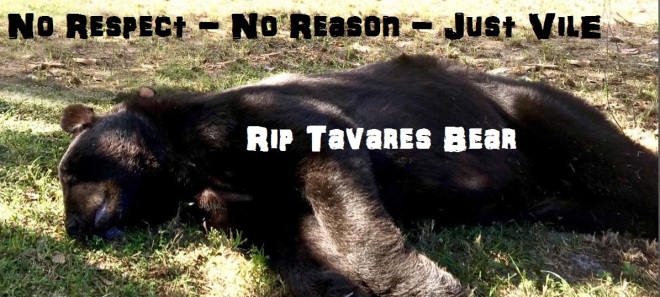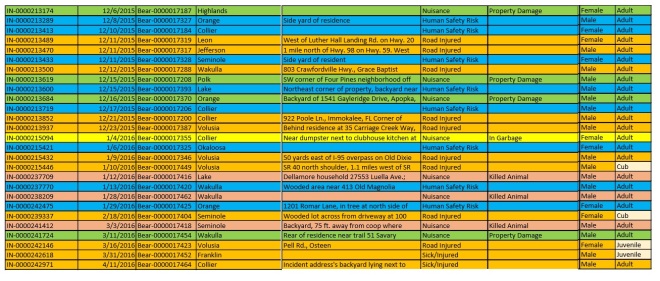This letter was shared and was given permission to reprint.

An Open Letter to FWC Executive Director Wiley, Chairman Yablonski, and Commissioners
On October 24th, 2016, a mature, male black bear was illegally shot and killed in my subdivision in Tavares, Lake County. To you, this event may mean nothing more than an additional task for your Law Enforcement Division. To me, and to many of my neighbors, this event was a vicious, senseless crime, and a heartbreaking metaphor for the larger plight of Florida’s wildlife. I would like you to understand what the death of this bear means to us, and to recognize the broader implications of what has just happened here.
I have an intensely personal stake in this case. I grew up in the city of Detroit, Michigan – not exactly the best place for wildlife viewing. In 2006, I was fortunate enough to be able to build my current home, which overlooks one of the last undeveloped parcels of land within the city limits of Tavares. For the last ten years, my family and I have experienced the company of owls, ospreys, a bobcat, coyotes, and even a diamondback rattlesnake. But, since 2009, the animal we most enjoyed was “Spanky,” the bear, whose pathway between “wilderness” and “civilization” took him past our back door.
You probably think it is inappropriate, even silly, for ordinary people like us to give wild animals names. Perhaps we should have given him an impersonal, scientific designation, like B2009. But, to us, the bear was not just an entry in a database or a red dot on a map: he was an individual, a neighbor, virtually a member of our extended family. The person who intentionally took him from us has stolen one of the most cherished parts of our lives – a living being who connected us to wild Florida in a way that nothing else can, adding a magical quality to a daily routine otherwise dominated by long hours of work. When we found ourselves asking why we were working so hard – what we were working for – this solitary bear helped provide a better answer than anything our realtor told us in 2006.
As you may have seen from the television interviews with some of my neighbors, our bear had never presented a threat to our safety. We had many “up close and personal” encounters with Spanky over the years, and not once did he act aggressively. His worst offense was to break into our screened porch – lured in by the irresistible aromas of a recent fish-frying session – but even then we simply shooed him out and realized that we were more responsible for the problem than he was. We learned how to be “bear wise,” and thus for seven years we and Spanky were able to coexist quite happily. For the small price of simple changes in behavior, we reaped the great benefit of having a beautiful animal in our lives.
Your staff often refer to wild animals like Florida black bears as “renewable natural resources.” Spanky was not a “resource.” He was a unique character, living the best life he could in the diminished habitat we humans had left for him, and doing it with a gentle dignity that deserved, and received, our respect. Nor was he “renewable.” He is gone. He will not be – can not be – replaced. We do not mean this in a purely sentimental sense, for the little pocket of habitat that served as his home is far too isolated to ever again receive a bear, unless by some miracle. And the sad truth is that there is scant time for even a miracle to occur, as much of the undeveloped land in question will surely be converted into habitat for humans within the next few years. When we protest, we are told that we can not stand in the way of “progress,” and left to wonder what amount of impact fees can ever compensate a community for the loss of its wild heart.
One might have hoped, at least, that Florida’s “Wildlife Conservation” Commission would share our concerns about the crushing of many wild hearts across the state, yet your response to the killing of our bear was chilling. Mr. Workman – echoing a long line of similar statements in bear-related press releases – told the Leesburg Daily Commercial that your agency “diligently works to limit the challenges presented by our state’s large black bear population, which has been scientifically estimated to be over 4,000 bears.” In these circumstances, it is hard to imagine a more intellectually perverse and morally reprehensible comment.
Your representation of Florida’s black bear situation is exactly backwards. The bear population that you continually refer to as “large and growing,” or “robust and resilient,” is in fact only 0.02% of the human population, a massive disparity perfectly captured by the isolation of our bear, alone amid thousands of people. And his fate – deliberately killed by a human of defective character – poses the question that should be of central concern to any conservation agency worthy of the name; to wit, how to limit the challenges presented to our small black bear population by a vastly larger and infinitely more destructive human population?
It seems to me that there are two very obvious reasons for your blatant and repeated reversal of the proper perspective. First, Florida is “open for business” and your constitutional independence will no more impede the commercial juggernaut rampaging across our state than our city’s zoning board. Beyond this, though, lies a transparent attempt to convince the public, through a steady “drip, drip, drip” of agency messaging, that the state’s bear population is “too large” and must therefore be “managed” by hunting. This being the case, why should any citizen of Florida reporting a wildlife crime expect a satisfactory resolution, when the very agency in charge of the investigation seeks to provide hunters with an “opportunity” to kill the same animals, just under more “regulated” conditions?
In order to demonstrate your competence to protect our wildlife from those who have no more respect for your regulations than they do for God’s creatures, you must first acknowledge the consequences of your own actions. Our bear was killed on the one-year anniversary of last year’s bear hunt. This is surely no coincidence. The killer was clearly disgruntled about being denied a legal “opportunity” to kill this (or perhaps some other) bear, so he decided to flout your authority and have some illegal fun instead. (The “resource,” of course, was completely wasted, because no part of “it” was “harvested.” Maybe that, if nothing else, will command your attention.) Had you not decided to permit a bear hunt in 2015, this uniquely despicable motivation would never have arisen, and our bear would most likely still be with us, enriching our lives as he had for years before. Allowing hunting sent a message that bears were “fair game,” a message that continues to ring in certain ears long after the “season” ended. When you now attempt to outlaw the “taking” of bears you are, in effect, speaking out of both sides of your mouth, and one can only wonder how many other bears have died without media attention as a result of the signal you sent.
I do not, therefore, expect you to care about any sense of “justice” for our bear, even though almost all well-adjusted people believe that he deserves it. But I do imagine that you might wish to protect the credibility of your agency by proving that you are, in fact, capable of conducting a vigorous investigation of a repugnant wildlife crime. For if you can not apprehend and prosecute those who willfully violate your regulations, then your claim that hunting is “regulated” will crumble along with my shattered dream. And if you do not stand up for the remaining animals who are about to be swept away by the rising human tide – if you allow them to be shot in the back, just like Spanky – then the character of your agency will itself be “fair game” for all Floridians who shared a dream similar to mine.
Spanky was a “good ambassador” for his species, winning many friends in our community. The same can not be said for the human who took his life. As stakeholders in the conservation of Florida’s black bear, we must now rely on your agency to hold the killer accountable for his actions, and to keep us notified of your progress at all phases of the investigation. Having contributed to the climate that fomented this crime, you owe us no less. The debt you owe to Spanky, however, can never be repaid.
Sincerely,
Jacqueline Elfers Nicholson,
Tavares, FL





You must be logged in to post a comment.